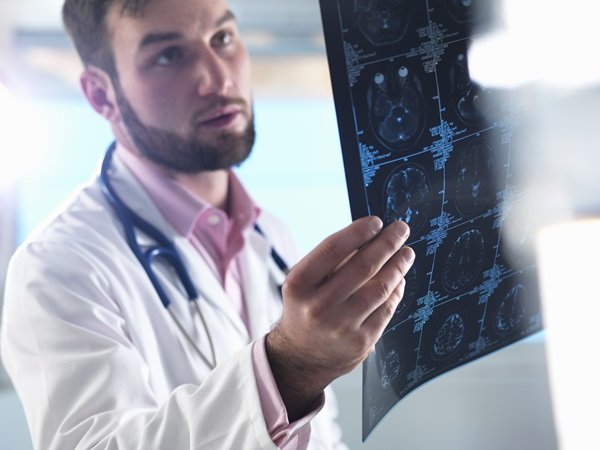Alzheimer’s is the most common form of dementia and one of the most challenging diseases for science. Although the vast majority of diagnoses are made in old age, studies show that the condition can start 15 to 20 years before individuals show the first signs.
The diagnosis of Alzheimer’s is made with clinical evaluation, imaging tests and research for biomarkers associated with the disease – tau and beta-amyloid proteins – in tests that investigate the cerebrospinal fluid (cerebrospinal fluid) collected through a lumbar puncture, a safe procedure and minimally invasive.
In the past, patients had to wait up to eight weeks to get test results from CSF samples collected by the hospital and shipped overseas. A new automated exam manages to reduce this time to just 20 minutes.
The Elecsys CSF test, offered by Roche Diagnóstica, evaluates in a simplified and standardized way the dosage of biomarkers of tau and beta-amyloid proteins in the collected cerebrospinal fluid. The procedure began to be carried out this month at Hospital Israelita Albert Einstein, which will also provide the service to private hospitals and laboratories in the country.
access to treatments
With automation, it is possible to simplify the analysis process and exclude interferences. “If before the most effective interventions with patients with initial disease did not exist, currently, medical advances have been expanding the possibilities of treatments in this group of people”, says neurologist Ivan Okamoto, from the Nucleus of Excellence in Memory (Nemo) of the Einstein.
Okamoto explains that, without clinical manifestation, the patient enters a phase of mild cognitive impairment (MCI) and, later, passes to a more advanced stage of the disease, which can be mild, moderate or severe.
Alzheimer’s is a degenerative disease caused by the death of brain cells that can appear decades before the first symptoms appear.PM Images/ Getty Images
 ***Photo-doctor-looking-tomography.jpg
***Photo-doctor-looking-tomography.jpgBecause it is a disease that tends to get worse over the years, early diagnosis is essential to delay the progression. Therefore, when presenting any symptoms of the disease, it is essential to consult a specialist. Andrew Brookes/Getty Images
 ***Photo-woman-with-hand-on-head.jpg
***Photo-woman-with-hand-on-head.jpgAlthough the symptoms are more common in people over 70 years of age, it is not uncommon for them to manifest in young people around 30. In fact, when this “premature” manifestation occurs, the condition is called early Alzheimer’s.Westend61/ Getty Images
 ***Photo-elderly-with-hands-on-head.jpg
***Photo-elderly-with-hands-on-head.jpgIn the initial phase, a person with Alzheimer’s tends to have changes in memory and starts to forget simple things, such as: where he kept his keys, what he had for breakfast, someone’s name or even the season of the year.urbazon/ Getty Images
 ***Photo-person-walking-in-a-maze.jpg
***Photo-person-walking-in-a-maze.jpgDisorientation, difficulty remembering the address where you live or the way home, difficulties in making simple decisions, such as planning what you are going to do or eat, for example, are also signs of the disease.OsakaWayne Studios/ Getty Images
 ***Photo-elderly-with-hands-on-head-2.jpg
***Photo-elderly-with-hands-on-head-2.jpgIn addition, loss of desire to perform routine tasks, change in behavior (making the person more nervous or aggressive), and repetitions are some of the most common symptoms.Kobus Louw/ Getty Images
 ***Photo-doctors-looking-tomography.jpg
***Photo-doctors-looking-tomography.jpgAccording to research carried out by the Alzheimer’s Drugs Discovery Foundation (ADDF), the presence of damaged proteins (Amyloid and Tau), vascular diseases, neuroinflammation, failure of neural and genetic energy (APOE) may be related to the onset of the disease.Rossella De Berti/ Getty Images
 ***Photo-hands-on-the-table-holding-medicine.jpg
***Photo-hands-on-the-table-holding-medicine.jpgAlzheimer’s treatment is done with the use of medications to reduce the symptoms of the disease, in addition to being necessary to perform physical therapy and cognitive stimulation. The disease has no cure and care must be taken until the end of lifeTowfiqu Barbhuiya / EyeEm/ Getty Images
0
Although mild cognitive impairment is not decisive for the development of progressive neurodegenerative disorders, about 35% of patients who present this factor evolve to dementia with Alzheimer’s traits.
“The clinical diagnosis in a patient with mild cognitive impairment is extremely challenging, so there is a need for more accurate diagnostic tests”, says the president of Roche Diagnóstica in Brazil, Carlos Martins.
Alzheimer’s symptoms
Alzheimer’s symptoms develop progressively. In general, patients notice memory failures first. As the disease progresses, there are difficulties with cognitive functions, which impair the performance of routine activities. The impacts are also felt in the language and perception of the world.
Clinical pathologist Gustavo Bruniera Peres Fernandes, Liquor Service coordinator at Hospital Israelita Albert Einstein, believes that the assessment of biomarkers will be essential for physicians to identify the best treatment options.
“We will move from a clinical classification, based on symptoms, to a biological classification, which verifies, based on tests, whether the patient has the condition and at what stage it is, in order to be able to intervene with the appropriate treatment”, points out Fernandes.
Get news from metropolises on your Telegram and stay on top of everything! Just access the channel: https://t.me/metropolesurgente.
